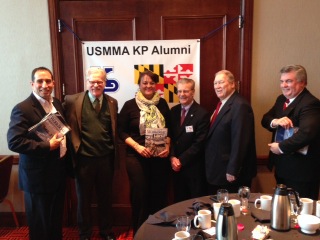On Sunday, I was the guest speaker at the U.S. Merchant Marine Academy Chesapeake Chapter alumni brunch in Baltimore. They asked me to talk about efforts in Washington to develop the first-ever National Maritime Strategy that carries the ambitious goal of reviving the U.S.-flag oceangoing fleet and charting the future for the entire maritime industry.
Attending were mostly older alum that have served their time in the industry but are still passionate about Kings Point and all things maritime. Some attendees were still involved in maritime unions and training, and a few others knew little about the industry and had no connection except being a friend or relative of someone who does.
I provided an overview on the decline of the U.S.-flag fleet (down from 1,200 in 1951 to less than 100 today), and reviewed some of the possible solutions that were discussed at a symposium in January held by the Maritime Administration in Washington to garner ideas for moving forward.
After a free-flowing discussion, one of the luncheon participants approached me and made a very interesting suggestion. She observed that given the aging population of the industry (the average age is 55 and upcoming retirements are a big worry for manning) perhaps students at the six state academies and the USMMA should get more involved in saving the industry they are joining.
She suggested that maritime academy students — even those that attend private training schools and academies — also be schooled in public speaking and in the broader points of the maritime industry’s contributions to the national economy. The idea is that a younger generation would be knowledgeable and become vested in promoting the industry. These students could become ambassadors of sorts, speaking on behalf of their training and the industry in various public forums. Perhaps they should also have a voice in crafting the national maritime strategy, as this will directly affect their future.
It was a small suggestion in the scheme of things, as components of a future national strategy will include heavy topics like tax reform, regulation, mariner training, preserving the Jones Act, etc. But I thought it was a very smart one, given a nagging criticism that the industry does little to promote itself to the general public.
And it got me wondering. What would Marad and officials of the nation’s maritime schools think of the idea? Could this be integrated into the curriculum at their schools? What are some other ways the younger generation of mariners can get involved in industry promotion and preservation?
Please drop me a line and share your thoughts.





